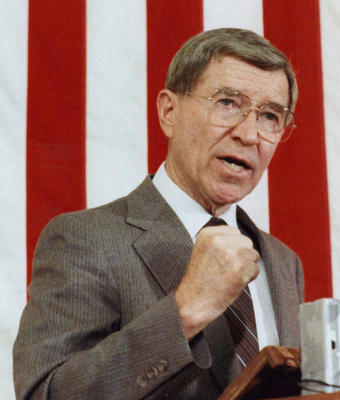Evan Mecham (Evan Mecham)

Evan Mecham (/ˈmiːkəm/ mee-kəm; May 12, 1924 – February 21, 2008) was the 17th Governor of Arizona. A decorated veteran of World War II, Mecham earned his living as an automotive dealership owner and occasional newspaper publisher. Periodic runs for political office earned him a reputation as a perennial candidate along with the nickname of “The Harold Stassen of Arizona” before he was elected governor, under the Republican banner. As governor, Mecham was plagued by controversy and became the first U.S. governor to simultaneously face removal from office through impeachment, a scheduled recall election, and a felony indictment. He was the first Arizona governor to be impeached. Evan Mecham served one term as a state senator before beginning a string of unsuccessful runs for public office. His victory during the 1986 election began with a surprise win of the Republican nomination, followed by a split of the Democratic party during the general election, resulted in a 3-way race. While governor, Mecham became known for statements and actions that were widely perceived as insensitive to minorities. Among these actions were the cancellation of the state’s paid Martin Luther King, Jr. Day and creating an unpaid King holiday on a Sunday, attributing high divorce rates to working women, and his defense of the word “pickaninny” in describing African American children. In reaction to these events, a boycott of Arizona was organized. A rift between the governor and fellow Republicans in the Arizona Legislature developed after the Arizona Republic newspaper made accusations of questionable political appointments and cronyism against the governor, accusations that Mecham contended were false.
Having served from January 6, 1987, to April 4, 1988, Evan Mecham was removed from office following conviction in his impeachment trial of charges of the obstruction of justice and the misuse of government funds – funds that Mecham maintained were private. A later criminal trial acquitted Mecham of related charges. Following his removal from office, Mecham remained active in politics for nearly a decade. During this time, he served as a delegate to the Republican National Convention and made his final runs for governor and for the U.S. Senate. Following his removal from office and acquittal in his criminal trial, Mecham remained active in politics for several years. He served as an at-large delegate to the 1988 Republican National Convention and in 1990 he made an unsuccessful attempt to regain the governor’s office. In 1992, he received one nomination vote for President of the United States at the Constitution Party National Convention, and then made a run for the U.S. Senate as an independent against incumbent John McCain, receiving 145,361 votes (about 10%). In 1995, Mecham became chairman of the Constitutionalist Networking Center, a group attempting to create a grassroots organization called the Constitutionally Unified Republic for Everybody (CURE). CURE advocated political candidates supporting a strict interpretation of the United States Constitution. Mecham spent several years attempting to start a new newspaper, but was unable to secure sufficient financial backing. In 1999, Mecham wrote his third book, Wrongful Impeachment. Health issues, such as Alzheimer’s disease and Parkinson’s disease, first reported in 2004, forced Mecham’s withdrawal from the public arena and his commitment to the dementia unit of the Arizona State Veteran Home. Evan Mecham died on February 21, 2008. He is interred at the National Memorial Cemetery of Arizona.
Born
- May, 12, 1924
- USA
- Duchesne, Utah
Died
- February, 21, 2008
- USA
- Phoenix, Arizona
Cemetery
- National Memorial Cemetery of Arizona
- Phoenix, Arizona
- USA



